Second cohort of scholars graduate from McMaster’s diversity-in-STEM program
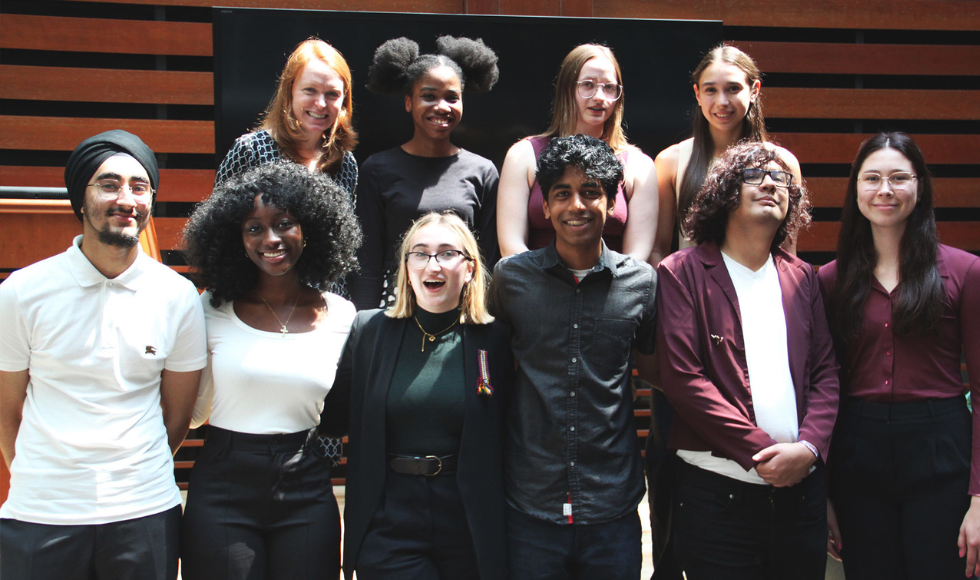
Members of the second cohort of the Biochemistry & Biomedical Sciences Summer Scholars Program (SSP) with SSP Chair Caitlin Mullarkey.
The Biochemistry & Biomedical Sciences Summer Scholars Program (SSP) has a new set of alumni.
Now in its second year, the program, which strives to promote diversity in STEM research, recently graduated a new cohort of students who identify as Black, Indigenous, and/or 2SLGBTQIA+.
The highly competitive program fully funds students to conduct research at McMaster University over the summer practicum. Supported by the Michael G. DeGroote Institute for Infectious Disease Research (IIDR) and the Global Nexus School for Pandemic Prevention and Response, the research program provides students with an intensive two-week research skills training boot camp and a 10-week lab placement.
Students in this year’s cohort worked on a breadth of biomedical topics, including cancer therapeutics, biophysics, and medicinal chemistry. Importantly, scholars tackled research questions related to some of the most pressing public health concerns, such as COVID-19 and Alzheimer’s disease.
“Our second cohort of scholars was just as inspiring as our first,” says Caitlin Mullarkey, Associate professor in the Department of Biochemistry and Biomedical Sciences and chair of the SSP. “Each scholar brought important perspectives, ideas, and lived experiences to the labs that they studied in. It was incredible to see their tremendous growth and development in just 12 short weeks. They all have very promising scientific careers ahead, and it was an honour to be a part of their journey.”
The new cohort recently presented its work at the SSP’s annual capstone research symposium, held on campus at the Faculty of Health Sciences’ Farncombe Atrium.
Some of the program’s students reflect on that work and also on their time in the SSP:
MIRACLE EFFIONG
 For Miracle Effiong, a biomedical/medical engineering student at the University of Toronto, the prospect of coming to McMaster to participate in the SSP over the summer was both “exciting and daunting.”
For Miracle Effiong, a biomedical/medical engineering student at the University of Toronto, the prospect of coming to McMaster to participate in the SSP over the summer was both “exciting and daunting.”
Once here, though, it was the former that took over. She was quickly embedded in the laboratory of Jonathan Bramson, the vice dean of research for the Faculty of Health Sciences, where she conducted important research into receptors that promote anti-cancer activity in T-cells.
“It’s an opportunity that I’m glad I took,” she says. “Learning new skills and techniques, learning more about how research works, becoming confident in my own decisions, and getting to know the other scholars and the program’s organizers were all highlights for me.”
TEGVIR GREWAL
 “Unforgettable” and “unparalleled” — two words that come to Tegvir Grewal as he recalls his experience in the SSP.
“Unforgettable” and “unparalleled” — two words that come to Tegvir Grewal as he recalls his experience in the SSP.
Working in the laboratory of Biochemistry and Biomedical Sciences professor Yingfu Li, the second-year honours biochemistry student spent his time in the program researching how the properties of functional nucleic acids could be harnessed to develop a biosensor for RNA modifications.
While Grewal says that the SSP afforded him a “safe space to explore the possibilities of scientific research,” he notes that his time away from the lab was equally as important.
“I discovered first-hand the humanity and compassion that’s present all throughout the Department of Biochemistry and Biomedical Sciences, and the program allowed me to foster many meaningful connections,” he says.
GEORGIA CAMPBELL
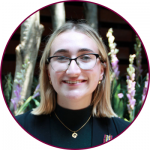 Georgia Campbell, a student in McMaster’s Integrated Biomedical Engineering & Health Sciences program, describes her time in the SSP as an “extraordinary experience.”
Georgia Campbell, a student in McMaster’s Integrated Biomedical Engineering & Health Sciences program, describes her time in the SSP as an “extraordinary experience.”
In the lab of Cécile Fradin, a professor in the Department of Biochemistry & Biomedical Sciences, Campbell spent the summer purifying the MamJ protein found in Magnetospirillum magneticum, a magnetotactic species of bacteria.
This research, she says, allowed her to meet other “science-loving folks” and helped her to gain valuable experience and new skills.
“The mentors, the other scholars, the lab teams, and everyone else involved in the program have established such an incredible space to build confidence and skills in this field,” says Campbell. “I will treasure this opportunity and the memories that came along with it forever.”
ELISABETH JONAH
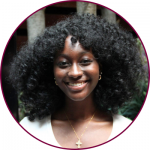 Elisabeth Jonah says that the SSP taught her as much about herself as it did about research.
Elisabeth Jonah says that the SSP taught her as much about herself as it did about research.
The level-II honours psychology, neuroscience and behaviour student spent the summer in the laboratory of Biochemistry & Biomedical Sciences assistant professor Lesley MacNeil, where she investigated the nematode C. elegans as a model for Alzheimer’s Disease. This work, she says, broadened her view of what the future might hold for her.
“The SSP provided me with an inside view into the world of research,” explains Jonah. “I was able to participate in an area of interest to me — neuroscience — and get a clearer view of what I want to pursue in the future.”
KYLIE MEYERMAN
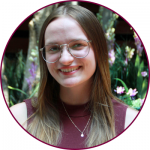 Health sciences student Kylie Meyerman says that the SSP is so much more than a typical studentship.
Health sciences student Kylie Meyerman says that the SSP is so much more than a typical studentship.
“It is a support system, a professional network, and also a thrilling opportunity to take part in some very cool research with excellent mentors,” Meyerman says. “I’m so pleased with how much I’ve grown and learned.”
Meyerman’s SSP research, conducted in the laboratory of Biochemistry and Biomedical Sciences associate professor Jonathan Schertzer, focused on different facets of metabolism. Meyerman explored method optimization for the measurement of the metabolite D-lactate, and also studied the expression of regulating genes to investigate lipolysis during acute fasting.
“I couldn’t have asked for a better way to spend my summer,” she says.
TYLER CARMONA
 Reflecting on a summer spent synthesizing beta-lactamase probes for research into the permeation of bacterial outer-membranes, biochemistry student Tyler Carmona says that the SSP was “amazing to experience.”
Reflecting on a summer spent synthesizing beta-lactamase probes for research into the permeation of bacterial outer-membranes, biochemistry student Tyler Carmona says that the SSP was “amazing to experience.”
Carmona, who worked in the lab of Jakob Magolan, a member of the IIDR and a professor in the Department of Biochemistry and Biomedical Sciences, says that the experience offered him both an introduction to the world of research and a real sense of community.
“The professors and students were always available to answer questions and provide support,” he says. “It was great to be part of this program.”
NIKINA BEAR-LOWEN
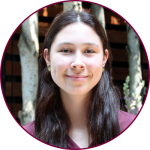 For Nikina Bear-Lowen, a student in the University of Guelph’s bachelor of science program, the SSP was a total introduction to wet lab research.
For Nikina Bear-Lowen, a student in the University of Guelph’s bachelor of science program, the SSP was a total introduction to wet lab research.
“My first two years of university were all online due to COVID-19,” she explains. “The SSP helped me discover research as a career path.”
In the laboratory of Dawn Bowdish, a professor of medicine at McMaster and a member of the IIDR, Bear-Lowen spent the summer analyzing the blood serum of older adults living in long-term care settings to determine why those with prior Omicron infections were more susceptible to being reinfected with the BA.5 variant.
As an Indigenous scholar, Bear-Lowen says that she’s excited to share her SSP experience with other Indigenous youth in hopes of inspiring them to set their own big academic goals.
EMMA ROBERTSON
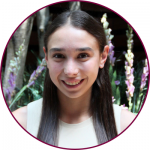 Emma Robertson is heading into her third year in McMaster’s Bachelor of Health Sciences program with some newfound confidence — all thanks to her time in the SSP.
Emma Robertson is heading into her third year in McMaster’s Bachelor of Health Sciences program with some newfound confidence — all thanks to her time in the SSP.
“I not only gained fundamental lab skills and learned so much about the research process, but I also developed confidence in myself,” she says.
Working in the laboratory of Amy Gillgrass, an IIDR member and an assistant professor in McMaster’s Department of Medicine, Robertson’s research involved genotyping breeding colony mice to ensure that they retained the transgenes that make them an ideal model for studying HIV/tuberculosis co-infection.
This research, Robertson says, was “an enlightening and influential experience,” noting also that the program itself will have a lasting impact on her.
“I am so grateful to have had the opportunity to participate in this program,” she says. “The skills I’ve learned and the relationships I’ve gained are something I will not soon forget.”


